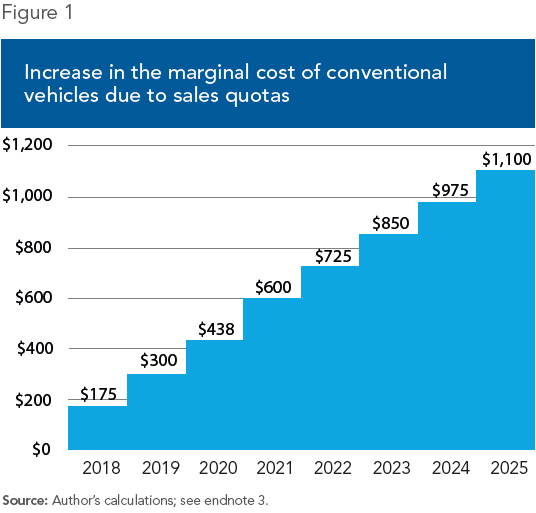Auto Industry Conflict: Dealers Reject Electric Vehicle Quotas

Table of Contents
Financial Risks Associated with EV Quotas
The financial burden of meeting EV quotas presents a significant hurdle for many dealerships. The transition to electric vehicles requires substantial upfront investment, creating considerable financial risks for already established businesses.
-
High upfront investment in EV inventory and charging infrastructure: Dealerships must invest heavily in stocking EVs, which often have higher initial purchase prices than comparable gasoline-powered vehicles. Furthermore, investment in charging infrastructure, including installation of Level 2 and potentially Level 3 chargers, represents a significant capital outlay. This impacts EV profitability directly.
-
Lower profit margins on EVs compared to traditional gasoline vehicles: Currently, profit margins on EVs are generally lower than those on internal combustion engine (ICE) vehicles. This is due to a combination of factors, including higher manufacturing costs and increased competition in the EV market. This lower EV profitability puts pressure on dealerships to sell more EVs to maintain their revenue streams.
-
Uncertainty regarding consumer demand and EV market growth: The rate of EV adoption varies significantly by region and demographic. Dealerships face uncertainty in predicting future demand, making inventory management challenging and increasing the risk of unsold EVs. Effective inventory management for EVs is therefore crucial.
-
Difficulty in balancing EV and gasoline vehicle inventory: Dealerships need to carefully manage their inventory to meet the demands of both EV and gasoline vehicle customers. Finding the optimal balance between these two types of vehicles requires sophisticated forecasting and inventory management strategies, especially considering the impact on EV sales.
-
Lack of government support for dealership EV infrastructure upgrades: While some governments offer incentives for consumers to purchase EVs, support for dealerships investing in charging infrastructure is often limited. This lack of support adds to the financial burden on dealerships already facing challenges with EV sales targets and quotas.
Training and Expertise Gaps for EV Sales
The shift to EVs also necessitates a significant increase in the technical expertise within dealerships. The lack of appropriately trained staff presents a major obstacle for dealerships trying to meet EV quotas.
-
Insufficient training for sales staff on EV technology and features: Sales staff need in-depth knowledge of EV technology, battery life, charging times, and other key features to effectively advise and sell these vehicles. A lack of training in these areas hampers effective EV sales and customer satisfaction.
-
Lack of qualified technicians to service and repair EVs: EVs have different maintenance and repair requirements compared to gasoline vehicles. A shortage of qualified technicians with the specialized skills and tools needed to service and repair EVs can lead to long wait times for customers and negatively impact dealership reputation. The impact on dealership profitability from EV maintenance is significant.
-
Complexity of EV battery technology and maintenance requirements: EV battery technology is complex, requiring specialized training and diagnostic tools. The high cost and complexity of EV battery repairs present another challenge.
-
Need for specialized tools and equipment for EV repairs: Repairing EVs requires specialized tools and equipment, which can be expensive to acquire and maintain. This further increases the cost of servicing and repairing EVs, impacting EV sales and profitability.
-
Difficulty attracting and retaining skilled EV technicians: The specialized nature of EV repair work makes it challenging for dealerships to attract and retain qualified technicians. Competition for skilled workers in the EV industry is fierce.
Consumer Demand and Market Readiness for EVs
Consumer demand for EVs, while growing, is not uniform across all demographics and regions. Factors that limit consumer adoption include range anxiety and charging infrastructure availability.
-
Uneven consumer demand for EVs across different regions and demographics: EV adoption rates vary widely depending on factors such as geographic location, access to charging infrastructure, and consumer income levels.
-
Concerns about charging infrastructure availability and range anxiety: Limited access to public charging stations and concerns about the driving range of EVs are major obstacles to widespread adoption. Range anxiety remains a key barrier to EV adoption for many consumers.
-
Lack of awareness about government incentives and subsidies for EV purchases: Many consumers are unaware of government incentives available to encourage EV purchases. Increased public awareness campaigns can help overcome this obstacle.
-
Varying levels of public acceptance and understanding of EV technology: Some consumers are still hesitant to adopt EVs due to a lack of understanding of the technology or concerns about its reliability. Educating consumers is crucial.
-
Competition from established and emerging EV manufacturers: The EV market is becoming increasingly competitive, with both established and emerging manufacturers vying for market share. This competition is impacting pricing and profitability for all players, including dealerships.
Potential Solutions and Compromises to Resolve the Conflict
Addressing the concerns of dealerships while promoting the growth of EVs requires a multifaceted approach involving collaboration between manufacturers, dealers, and governments.
-
Collaboration between manufacturers and dealers to develop realistic sales targets: Manufacturers and dealers need to work together to establish achievable EV sales targets that consider the challenges faced by dealerships, specifically those relating to EV profitability.
-
Government incentives and subsidies to support EV infrastructure development: Increased government support for the development of charging infrastructure is essential to alleviate range anxiety and encourage EV adoption. Subsidies for both consumers and dealerships can encourage a smoother transition.
-
Phased implementation of EV quotas to allow for gradual adaptation: A gradual implementation of EV quotas would give dealerships more time to adapt to the changing market conditions and invest in necessary infrastructure and training. A phased approach allows for more effective planning.
-
Increased funding for dealer training and education programs: Governments and manufacturers should invest in comprehensive training programs to equip dealerships with the skills and knowledge needed to effectively sell and service EVs. Increased training is critical for successful EV sales.
-
Development of innovative financing options for EV inventory and infrastructure: Innovative financing options can make it easier for dealerships to invest in EV inventory and charging infrastructure. This should include government-backed loan programs or tax incentives.
Conclusion
The conflict over electric vehicle quotas highlights the challenges of transitioning to a sustainable automotive industry. Dealerships face significant financial risks, training challenges, and uncertainties regarding consumer demand. Resolving this conflict requires a collaborative effort involving manufacturers, dealers, and governments. Finding a balanced approach that addresses the concerns of dealerships while accelerating the adoption of electric vehicles is crucial. Open dialogue and collaborative solutions are essential to navigate the complexities of the electric vehicle quota issue and ensure a smooth transition for the entire automotive industry. Let's work together to find solutions that support both dealers and the growth of electric vehicles.

Featured Posts
-
 4 Gol Birden Soerloth La Liga Da Firtina Gibi Esti
May 26, 2025
4 Gol Birden Soerloth La Liga Da Firtina Gibi Esti
May 26, 2025 -
 The Best British Pop Culture Movies Of All Time
May 26, 2025
The Best British Pop Culture Movies Of All Time
May 26, 2025 -
 A Fungi That Could Spread And Eat You From The Inside Out As The World Heats Up
May 26, 2025
A Fungi That Could Spread And Eat You From The Inside Out As The World Heats Up
May 26, 2025 -
 Paramedic Excellence On Display At Police And Emergency Services Games
May 26, 2025
Paramedic Excellence On Display At Police And Emergency Services Games
May 26, 2025 -
 Jenson Fw 22 Extended Features And Updates
May 26, 2025
Jenson Fw 22 Extended Features And Updates
May 26, 2025
